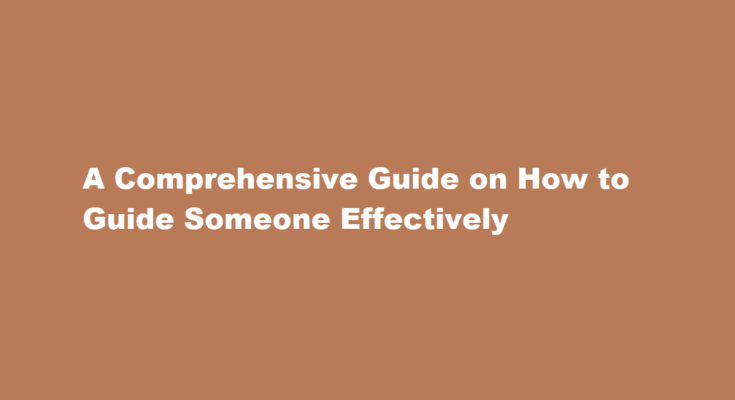Introduction
Guiding someone effectively is a skill that can make a significant difference in their personal or professional growth. Whether you’re mentoring a colleague, coaching a friend, or helping a family member, the ability to provide guidance in a helpful and constructive manner is invaluable. In this article, we will explore the key principles and strategies for guiding someone successfully, ensuring that your support is both unique and informative.
Establish a Connection
Before you dive into guiding someone, it’s crucial to establish a strong connection based on trust and empathy. Take the time to get to know the person, understand their goals, values, and challenges, and show genuine interest in their well-being. Building rapport creates a foundation for effective guidance.
Active Listening
Effective guidance begins with active listening. Encourage the person to express their thoughts and feelings openly. Ask open-ended questions and refrain from interrupting or imposing your own opinions. By giving them your full attention, you create a safe space for them to share and explore their thoughts.
Clarify Goals
Help the individual define their goals and objectives. Guide them in setting specific, measurable, achievable, relevant, and time-bound (SMART) goals. Clearly understanding their aspirations enables you to provide targeted and relevant advice.
Assess Strengths and Weaknesses
Assess the person’s strengths and weaknesses objectively. Identify areas where they excel and those that require improvement. Tailor your guidance to leverage their strengths while addressing their weaknesses constructively.
Offer Constructive Feedback
Feedback is a crucial component of guidance. Provide feedback that is specific, actionable, and delivered in a non-judgmental and supportive manner. Highlight their achievements and suggest areas for improvement, always emphasizing growth rather than criticism.
Empower Decision-Making
Guide rather than dictate. Encourage the person to make their own decisions by presenting options and discussing pros and cons. Empowering them to take ownership of their choices fosters independence and self-confidence.
Teach Problem-Solving
Teach problem-solving skills to equip the individual with the tools needed to overcome obstacles. Encourage them to break down complex challenges into smaller, manageable steps and brainstorm solutions collaboratively.
Maintain Patience
Guidance often requires patience, especially when progress is slow or setbacks occur. Be patient and understanding, offering continuous support and encouragement. Celebrate small victories along the way to keep motivation high.
Lead by Example
Set a positive example by embodying the qualities and behaviors you encourage in the person you’re guiding. Demonstrating consistency and integrity reinforces the credibility of your guidance.
Provide Resources
Offer access to resources, whether they are books, online courses, workshops, or networking opportunities. Providing relevant resources can significantly enhance the guidance you provide.
Monitor Progress
Regularly check in on the person’s progress toward their goals. Adjust your guidance as needed based on their evolving needs and circumstances. Celebrate achievements together and adapt strategies for any roadblocks encountered.
Encourage Self-Reflection
Encourage self-reflection as a means of personal growth. Encourage the individual to assess their actions, learn from experiences, and adapt their approach accordingly. Self-awareness is a powerful tool for continuous improvement.
Frequently Asked Questions
How many questions should a FAQ have?
Fewer than five questions might indicate you haven’t done your research… or that you didn’t need an FAQ to begin with. Fielding dozens of questions isn’t good either, but if they’re all necessary, consider splitting your FAQ into multiple pages.
Why are FAQs frequently asked questions important?
Frequently asked questions, or FAQs as they are known, are a great way to improve your customer’s experience of your website. It allows you to answer the questions that are most commonly asked surrounding your product or service. At the same time, there are also many other benefits to having FAQs on your website.
Conclusion
Guiding someone effectively is a dynamic process that requires patience, empathy, and adaptability. By following these principles and strategies, you can provide unique and informative guidance that empowers individuals to reach their full potential. Remember that successful guidance is not about imposing your ideas but rather about helping others discover their own path to success. Ultimately, your guidance can make a profound and lasting impact on someone’s life, contributing to their personal and professional growth.
Read Also : Navigating Your Future How to Choose the Right Career Path



